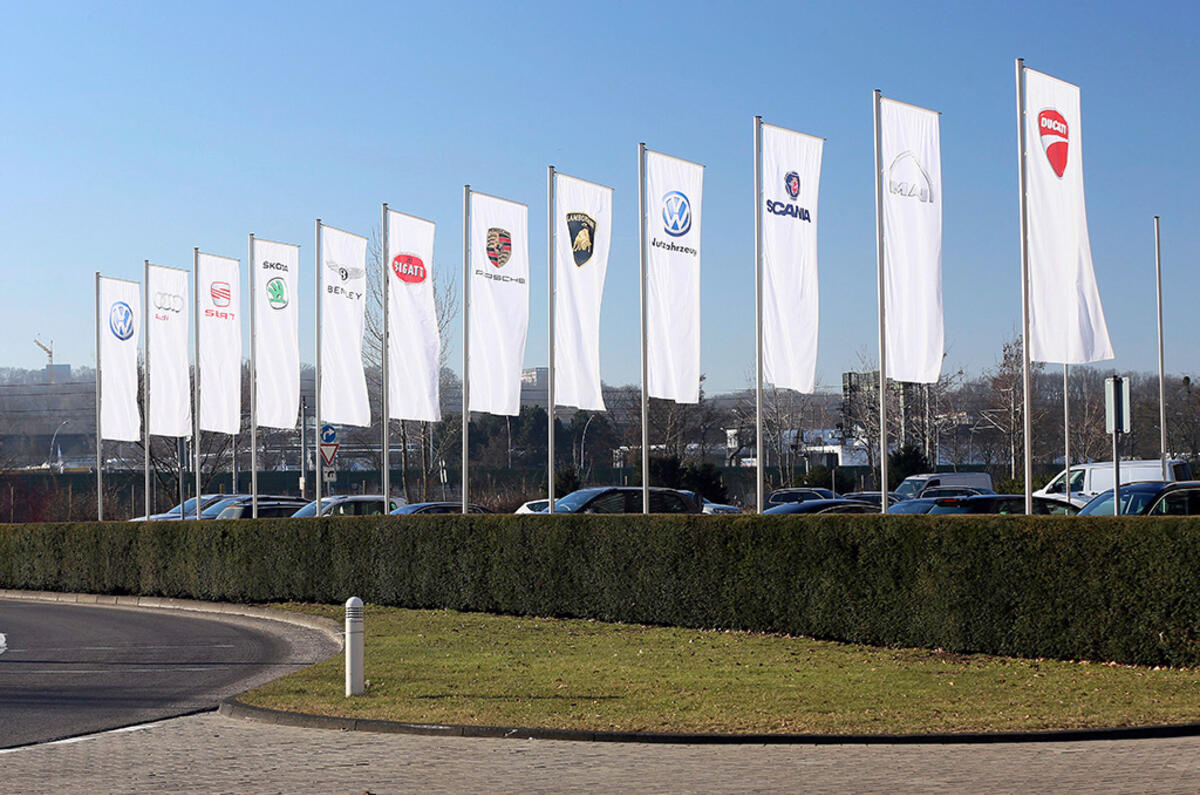You need to spend 45 minutes with the Volkswagen Group’s latest full-length financial press release to realise just how precarious the Volkswagen brand’s situation has become.
There are some bright spots. Between January and March this year, vehicle deliveries across the whole VW Group crept up to 2,508,000 units, a rise of 0.8% on the same period in 2015. And the VW Group now has a handy £19.8 billion in cash in the bank, a massive 25% jump on the same time last year.
But the bad news makes a much longer list. Overall sales revenue fell 3.4% (which VW blames mainly on exchange rate issues), profit margins after tax fell from 7.5% for the whole VW Group to just 6.3% and after-tax profits fell almost 20%, to £1.8bn from £2.24bn.
Despite the massive media bashing over the emissions scandal, the advantage of having a portfolio of brands is shown in the sales performance of the various marques. Audi was up by 4% to nearly 456,000 sales in the first three months of the year.
Skoda was up 4.3% to nearly 277,000 sales, Seat crept up 0.2% to 103,000, Porsche leapt 5% to just short of 56,000 sales and Lamborghini was up 5% to 928 sales, from 884.
Volkswagen sales decrease by 2% in first four months of 2016
(I’m going to divert quickly to Bentley’s situation. The British brand’s sales were down an alarming 30% in the first three months of the year, from 2232 units to just 1554. Profits collapsed from £37 million to a £41m loss. The company must hope that existing Bentley buyers are not switching straight to the Bentley Bentayga SUV, because these kinds of direct substitution sales will not grow the brand significantly).
Volkswagen brand sales were down just 1.3%, but dig into the fine detail and VW is showing signs of significant stress. According to the official figures, the VW brand had a sales revenue of £19bn, but VW’s operating profit collapsed from £392m last year to just £55.7m between January and March.





Join the debate
Add your comment
There are more cheats
Loud pipes were already out of control in the UK. Although against the law for years and an MOT failure according to 7.1, they are deep rooted into UK culture with most MOT testers being enthusiasts themselves, our roads get noisier not just more poisonous.
Big companies...
Another company
Another company
Another company
Another company
Another company
Repetitive
Creatures of habit
The only thing I would seek to change on my current Golf is better suppression of road noise. But a change from the Bridgestones may cure that soon. Oops, missed out something, the absence of USB ports is oddly out of keeping with the modern world. Perhaps the Golf is like a comfortable pair of shoes, the ones you go back to even though there are others in the shoe rack.
VW's reputation was well
Polos and Golfs were often favoured among retirees, who today seem to be happy buying Kias.
Does everyone care about the scandal?
Yes they care about the scandal
The fines which will inevitably be dished out in the US are not the big problem in themselves; VW can afford to pay those without too much trouble, regardless of whatever number it ends up at. The bigger problem is the brand perception that those fines create, and the fact that it will keep popping up in the media, which will turn buyers off the brand. Volkswagen Group will be hoping that it can keep the bad news concentrated on the core VW brand and away from the cash cow that is Audi.
I would imagine that Volkswagen UK and other regional offices agree their new car quotas with head office in Wolfsburg 12 months in advance, so they can't simply decide to reduce their sales targets because the cars will simply keep coming through. So they have to sell them, even if it means taking a hefty loss.
Anecdotally, I have spoken to people at a number of dealerships who say they are under enormous pressure to keep hitting both new and used car sales targets, with margins being shredded to get deals done. Dealers at rival brands are also reporting increased conquest sales from current VW owners. I'm not sure if there are official figures that can substantiate that, but residual values appear to gradually be falling on key VW models. It starts with auctions, and could take months to really filter through to retail used car prices in franchised showrooms.
The figures listed by Hilton don't reflect the pain being felt at VW UK or at dealership level, where more money is being haemorrhaged. Wolfsburg may possibly have reduced its prices to VW UK, but margins for distributors and dealers are also being significantly eroded to maintain the sales numbers. If dealers start going to the wall or dropping their VW franchises, it compounds the perception and therefore make the problem worse.
Interesting.....
You're right, plenty don't care... yet
But one of the big reasons people have liked VWs is the residual value when you come to sell your car. If the initial post-Dieselgate fall continues, and owners start losing real pounds and pence at resale time, VW's position will be much harder to rebuild.
You're right, plenty don't care... yet
But one of the big reasons people have liked VWs is the residual value when you come to sell your car. If the initial post-Dieselgate fall continues, and owners start losing real pounds and pence at resale time, VW's position will be much harder to rebuild.